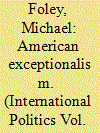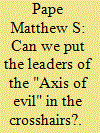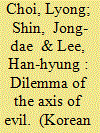| Srl | Item |
| 1 |
ID:
082132


|
|
|
|
|
| Publication |
2007.
|
| Summary/Abstract |
Because American populism has traditionally been associated with indigenous themes and inward perspectives, it has never been thought to be particularly relevant to the United States' outlook upon the international order or its understanding of the generic requirements of foreign policy-making. However, recent developments surrounding the formulation and prosecution of the war on terror have cast doubts on this negative correlation. Using four thematic and analytical categories, the article reveals President Bush's close dependency upon characteristically populist principles in the way that the issue was presented to, and mediated with, the American public. It surveys the way that the Bush team employed populist narratives in advocating the need for alternative channels of international action outside both the customary agencies of collective security and the established conventions of international law. Although the usage of populist techniques was initially effective, the administration subsequently experienced some of the defects that have traditionally afflicted populism as an agency of political transformation
|
|
|
|
|
|
|
|
|
|
|
|
|
|
|
|
| 2 |
ID:
086154


|
|
|
|
|
| Publication |
2009.
|
| Summary/Abstract |
Seven years ago, in his State of the Union address on Jan. 29, 2002, U.S. President George W. Bush warned of an "axis of evil" that was engaged in assisting terrorists, acquiring weapons of mass destruction, and "arming to threaten the peace of the world." In Bush's telling, this exclusive new club had three members: Iran, Iraq, and North Korea. Bush's policy prescription for dealing with the axis of evil was preemption, and just over a year later he put this doctrine into action by invading Iraq.
|
|
|
|
|
|
|
|
|
|
|
|
|
|
|
|
| 3 |
ID:
022901


|
|
|
|
|
| Publication |
Autumn 2002.
|
| Description |
62-71
|
|
|
|
|
|
|
|
|
|
|
|
|
|
|
|
| 4 |
ID:
169153


|
|
|
|
|
| Summary/Abstract |
This research examines the international relations between North Korea (the
Democratic People’s Republic of Korea or DPRK) and Iran in the context of their
shared perception of a threat from the United States. We discuss the conventional
idea of the international relationship—the enemy of my enemy is my ally—to
explain Pyongyang–Tehran relations, evaluate its past and current relations, and
offer policy suggestions for the recent denuclearization approach toward North
Korea and Iran. Using newly discovered archival resources and political records, we
challenge the conventional idea that the two states share the same threat perception
in a consistent manner and suggest the level of their military cooperation changes
depending on the approach from Washington and the international community. This
research provides a more exact picture of the international relations North Korea
and Iran since the 1980s and of the link between their shared threat perception and
denuclearization debates.
|
|
|
|
|
|
|
|
|
|
|
|
|
|
|
|